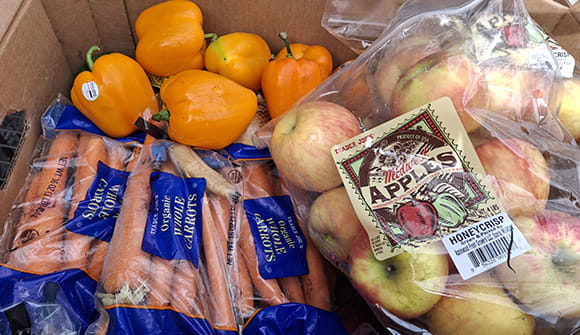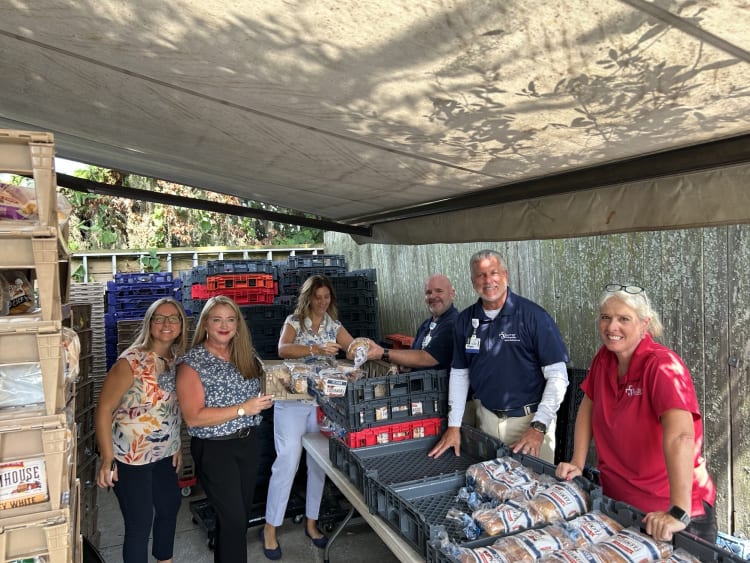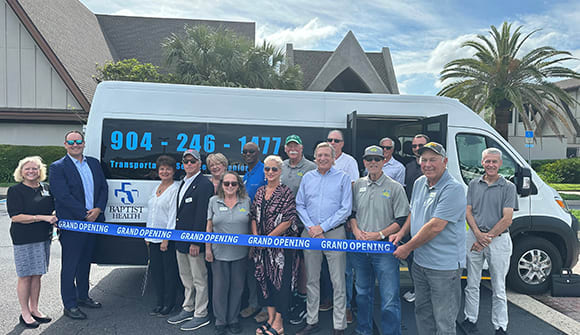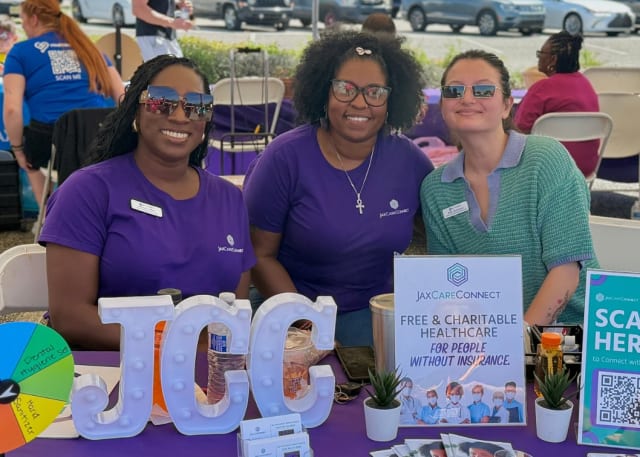Clay County agency ‘rescues’ food for communities in need
'Waste Not Want Not' distributes food to organizations in 14 counties.
Article Author: Deborah Circelli
Article Date:

With every type of food Waste Not Want Not rescues from a grocery store or restaurant, a person is also rescued from hunger.
Waste Not Want Not, which celebrates its 35th anniversary this year, helps agencies in 14 Northeast Florida counties provide food to those in need. The agency, which has a distribution center in Orange Park, rescues 2 million pounds a year or more than 4,000 pounds a day. The food from more than 50 donors is then distributed to about 100 community organizations, including food banks, soup kitchens and ministries, as well as given to the homeless under bridges and in shelters.
Major grocery store chains and restaurants donate food that may be slightly bruised or that they overordered or is just past the best-by date, but not the expiration date.
“We get food out into the community immediately,” said Kathleen Spears, PhD, Waste Not Want Not executive director. “It is so important for people confronting debilitating, chronic illnesses to have wholesome, healthy food that oftentimes they can’t afford.”
Agencies are seeing an increase in people who are making tough decisions between paying an electric bill or putting food on the table.
In Clay County alone, the food insecurity rate based on population increased from 8% in 2021 to about 12% in 2023. Duval County also went from about 10.6% to close to 15%, according to the Florida Department of Health.

Waste Not Want Not volunteers load food to bring to area agencies.
Bridging the gap for those in need
Each Saturday, The Kitchen of Clay County receives food from Waste Not Want Not to distribute among its four locations.
“This food is critical in supplying our 800 guests with meals each week. For many of our guests, these meals help bridge a gap to prevent children, the elderly and the undernourished from facing a food deficit in their week,” said Jennifer Knight, vice president of The Kitchen of Clay County.
Dozens of Waste Not Want Not volunteers help pick up food from donors in addition to the agency’s truck. At the distribution center where community organizations pick up food daily, Waste Not Want Not will be able to give out even more food through a strategic investment from Baptist Health to increase storage capabilities. A technology donation will also enhance data collection on adults and children served and donation tracking. Additional funding is helping to deliver more food in Baker County, as well.
Because of those Baptist Health donations, Spears said another donor is providing funding to expand the Orange Park distribution center.
“Baptist Health has been such an extraordinary partner,” Spears said. “We both want to make sure people have access to protein and produce to improve health outcomes and ensure people are not going to the ER and entering the health care system at the wrong point.”

Baptist volunteers and students provide helping hand
Baptist Medical Center Clay leaders also joined with Waste Not Want Not and volunteered time to help stock and separate donated food items in preparation for future distribution.
“Our leaders felt a deep sense of reward, knowing the work we were doing helps alleviate food insecurity and benefits a significant number of individuals,” said Ed Hubel, FACHE, Baptist Clay hospital president.
Students from Baptist Health’s Tipping the Scale mentorship and job readiness program also created a food pantry donation project to support the agency’s work. The 40 high school students collected canned goods and bags for distributing food, and helped spread awareness of the agency online.
“Through this experience, students not only provided meaningful support to families facing food insecurity, but also saw firsthand how thoughtful actions, whether through donations or digital awareness, can make a lasting impact in their community,” said Paul Cook, project manager leading youth programming for Baptist Health's Department of Community Health & Well-Being.
Spears is grateful to all the agency’s volunteers and donors.
“We couldn’t rescue the food without our volunteers, and we couldn’t feed the hungry without our partners,” Spears said.
Task Force addresses food insecurity
Baptist Health is also part of an initiative in Clay County to address barriers to food.
The Clay County Food Insecurity Task Force was launched in July 2025, providing awareness of and access to resources and creating more education on the Supplemental Nutrition Assistance Program (SNAP) and Fresh Access Bucks, which makes fresh, local produce more accessible. The task force connects people in need to resources available and is identifying ways to increase the impact and effectiveness of the dozens of organizations in Clay County that serve those in need.
Alexandra Reinhardt, project manager leading team member volunteerism for Baptist Health's Department of Community Health and Well-Being, is co-leading the task force with Kathleen Spears, PhD, Waste Not Want Not executive director.
Reinhardt said the task force was born out of an idea that to address food insecurity (one of Baptist Clay’s Community Health Needs Assessment priorities), the solution needed to be holistic. The task force is examining why the percentage of Clay County residents experiencing food insecurity has remained constant for the last several years despite organizations providing a significant amount of food to residents in need.
While in its infancy, Reinhardt points to the mission to “reduce hunger and improve community health by expanding equitable food access, advancing education, and driving systemic change through collaboration and community voice.”
“The Clay County Food Insecurity Task Force is critical to truly moving the needle in addressing food insecurity in Clay County,” Spears said. “We have subgroups committed to achieving specific goals, including building awareness of available resources to the food insecure, ensuring there are resources available after hours and on weekends, and educating employers about resources available for their food insecure employees, as many of the people we serve are the working poor. We are also pulling the organizations fighting hunger in Clay County together to identify opportunities to partner in order to strengthen and broaden their impact.”
Learn more about Baptist Health’s commitment to improving health and well-being in Northeast Florida by working together with local nonprofit agencies to address a variety of needs. Read the Community Health Needs Assessment.


